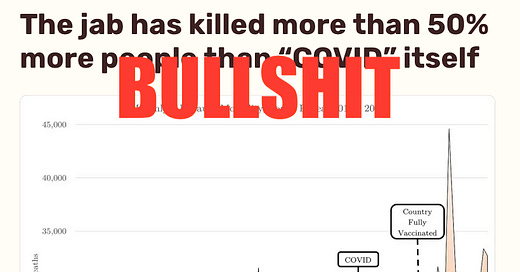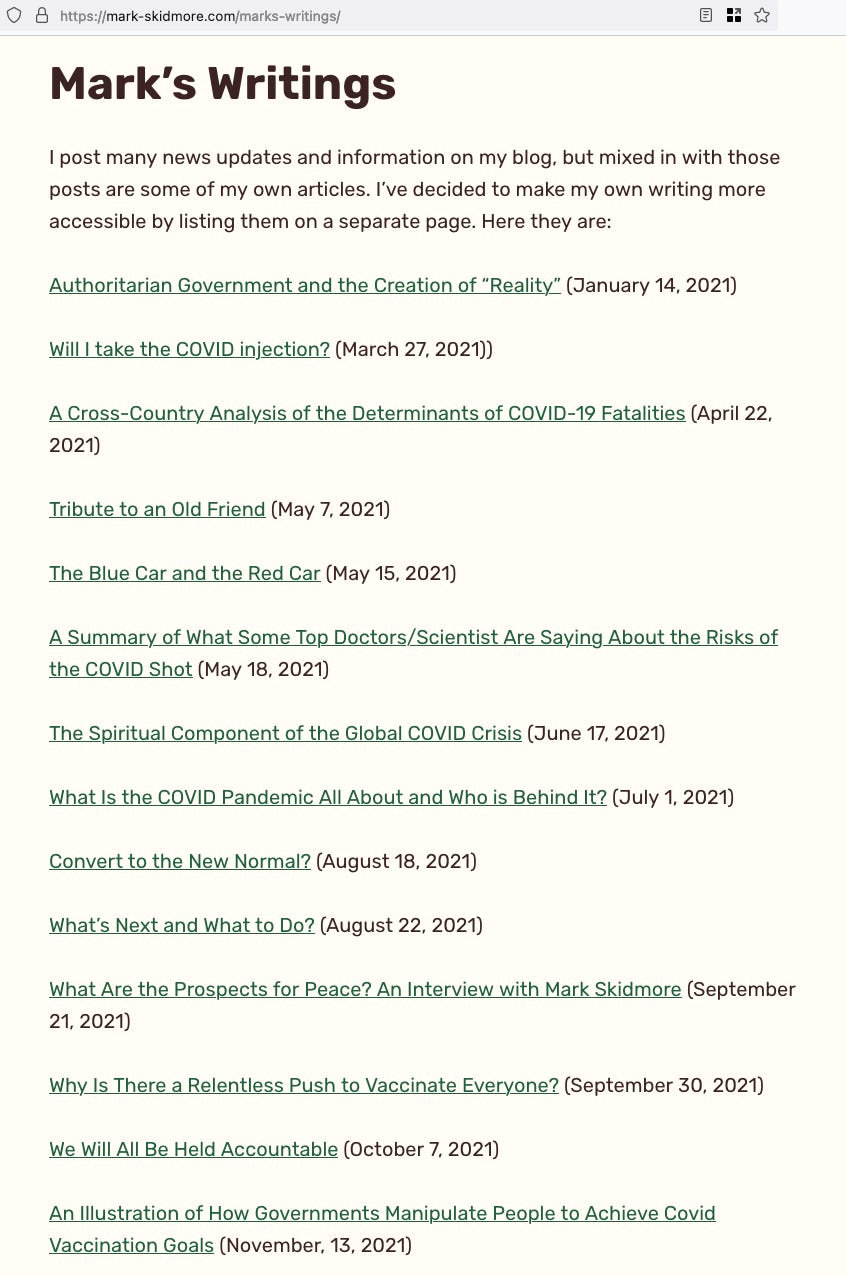What happens when an economist tries to do real science?
He becomes a hero of disinformation spreaders everywhere, of course
This is outside the Bad Newsletter’s normal purview but I’m running with it because it’s one of the most darkly hilarious things I’ve seen in a long time.
It’s becoming clearer all the time that the discipline of economics, with a few notable exceptions, is closer to a religious high priesthood than anything even approximating a science. Much of economics is polemic, but with graphs. And there’s never been a finer example of the discipline’s colossal hubris than the boondoggle that’s just gone down at the supposedly prestigious journal BMC Infectious Diseases.
The meat of the story is detailed by the Chronicle of Higher Education. Here is the bullet point version:
A paper was submitted to BMC Infections Diseases, peer-reviewed, and published
It purported to show that the number of deaths caused by Covid vaccines “may be as high as 278,000.”
It was based on methodology so shoddy it’d likely be thrown out by a high school science fair
It was written by an anti-vaxxer
It was funded by an anti-vaxxer
It was essentially all unmitigated fucking bullshit
I read the Chronicle’s account in a daze of increasing incredulity. Epidemiologist and Ph.D. candidate Gideon Meyerowitz-Katz said the paper — The role of social circle COVID-19 illness and vaccination experiences in COVID-19 vaccination decisions: an online survey of the United States population — was “among the worst things I’ve ever seen published.” And here’s what might have been a big part of the reason:
Yes, Mark Skidmore is an economist. Not an epidemiologist, an economist. And as the Chronicle noted, what he “stands by” is an absolute joke of a methodology:
[Skidmore] took the number of vaccine-caused deaths that the respondents reported knowing about — 57, according to the study — and used them to estimate the total number of people who had died for the same reason. To flesh out the estimate, he counted deaths reported to a federal database called the Vaccine Adverse Event Reporting System, known as VAERS, and arrived at the figure 278,000.
This methodology for calculating vaccine-induced deaths was rife with problems, observers noted, chiefly that Skidmore did not try to verify whether anyone counted in the death toll actually had been vaccinated, had died, or had died because of the vaccine.
Skidmore’s ridiculous effort became the most-viewed paper in BMC Infectious Diseases’ history, because fringe media outlets eager to boost its fanciful conclusions made it go viral. The horse bolted straight into a china shop, and gave anti-vaxxers everywhere something they’d never shut up about: an actual, peer-reviewed study.
Too bad nobody gave the peers who did the reviewing too much of a look, because the named peer’s qualifications are as follows:
That’s right — the named peer reviewer, Yasir Elhadi, does not have a PhD, and may not have even had a Master’s degree when he reviewed the paper. What’s more, you’ll note that he holds a “Bechalor” in Clinical Pharmacy from Omdurman Islamic University in Khartoum, Sudan. Clearly, the peer review process was in need of, well, peer review.
It got some pretty quickly. Once the study was published, the scientific community pounced, and the journal relented. As of 11 April 2023, the study is retracted, about as profoundly as it’s possible for a retraction to be. Let’s decode some of the language in BMC Infectious Diseases uses, because not only is it a savage self-indictment, it is deeply funny. All emphasis is added by me.
The editors have retracted this article as concerns were raised regarding the validity of the conclusions drawn after publication.
This means something like “every qualified epidemiologist in the world emailed us asking what in the almighty fuck we were playing at.”
Post-publication peer review concluded that the methodology was inappropriate as it does not prove causal inference of mortality, and limitations of the study were not adequately described. Furthermore, there was no attempt to validate reported fatalities, and there are critical issues in the representativeness of the study population and the accuracy of data collection.
“Furthermore, there was no attempt to validate reported fatalities”
“there was no attempt to validate reported fatalities”
“no attempt to validate reported fatalities”
“no attempt to validate reported fatalities”
“no attempt to validate reported fatalities”
This means that the claimed number of deaths was just kind of completely made up.
Whew. That’s a lot packed into a 113-word retraction. So far, we’ve got we fucked up, every qualified person knows we fucked up, and the study should never have been published because it was bullshit from top to bottom. But we’re not done yet! What else did it say?
Lastly, contrary to the statement in the article, the documentation provided by the author confirms that the study was exempt from ethics approval and therefore was not approved by the IRB of the Michigan State University Human Research Protection Program.
Oh.
The author lied, in print, about having ethics approval.
Perhaps it doesn’t need to be said, but Mark Skidmore shouldn’t have a job. In my opinion, his actions well go beyond the remit of academic freedom into outright fabrication and lies, and his contribution to the disinformation economy has done untold damage. And Mark has form. Let’s find out what he’s been posting on his personal blog, which rejoices in the ironic title of “Lighthouse Economics.”
But I don’t know Mark. Perhaps he’s contrite. What’s he been posting since what (for any actual scientist) should be a career-shattering, deeply shameful take-down?
Well. There you go.
I hope you’ve enjoyed this insight into how some aspects of the disinformation economy work. Perhaps I should dabble in economics myself? The more I find out about where the bar for economics is set, the more I feel that I could just kind of skip over it.









> "This means the claimed [number of deaths] was just kind of completely made up."
The basic axiom upon which all basic economics is founded on is this statement. Where the term they are seeking to quantify can be replaced with whatever it is you're trying to work out. It is a universal a priori syllogism so perfect you can apply the formula to anything. This ab initio sentence can be used to explain any literally meaningless economic term including (but not limited to):
- Gross Domestic Product,
- Consumer Price Index,
- Dynamic Stochastic General Equilibrium,
and many more.
A charitable view of economics (the type that say David McWilliams espouses) is that it is about figuring out what levers we can pull — or what levers are being pulled — to make people change behaviour. A realistic view on the vast majority of Economists and their graphs is that they're doing something worse than trying to figure out complex patterns from tea leaves, they're applying unflinchingly simple theories to exceedingly complex problems and using their best reckons to... well... fuck... to what? The economists themselves don't seem to benefit from their predictions, so one can only assume, using economists same logic, that they've drunk some pretty strong Kool-Aid that has been dished out by some of the worlds most reprehensible people. A great example of the unthinking nature of Economists are the lads in charge of New Zealand's Reserve Bank who a couple of weeks back, and I'm not shitting you here, suggested that "unemployment needed to rise to 5.7 percent to quell inflationary pressures, meaning another 75,000 job losses."*
What sort of psychopath can say the livelihoods of tens of thousands of people, their families, and their futures are less important than some completely made up number (inflation — which could be controlled by so many more factors other than making people unemployed)?
The answer is, of course, an economist. I have proven this by doing a study where I asked the people in the room where I am right now (n=1) if they thought all the economists they knew were psychopaths. The results were conclusive: 100% of the people (in this room) think 100% of the economists they know are psychopaths. Using a statistical model that accounts for biases, population demographics, and socioeconomic status, the author concludes that 100% of economists are psychopaths.
Give me a god damn PhD in economics. Someone. Anyone.
*https://business.scoop.co.nz/2023/04/05/out-of-touch-reserve-bank-putting-unemployment-ahead-of-wellbeing/
If only. IF ONLY.... Everyone who had shared this clap-trap diatribe on their socials in the first place were to retract and publish the corrected information instead. Hell-to-tha-naww-naww-nawwww. You can just hear the howls of ‘you’re only looking at the mainstream science...’
Great article as always, Josh. More please!